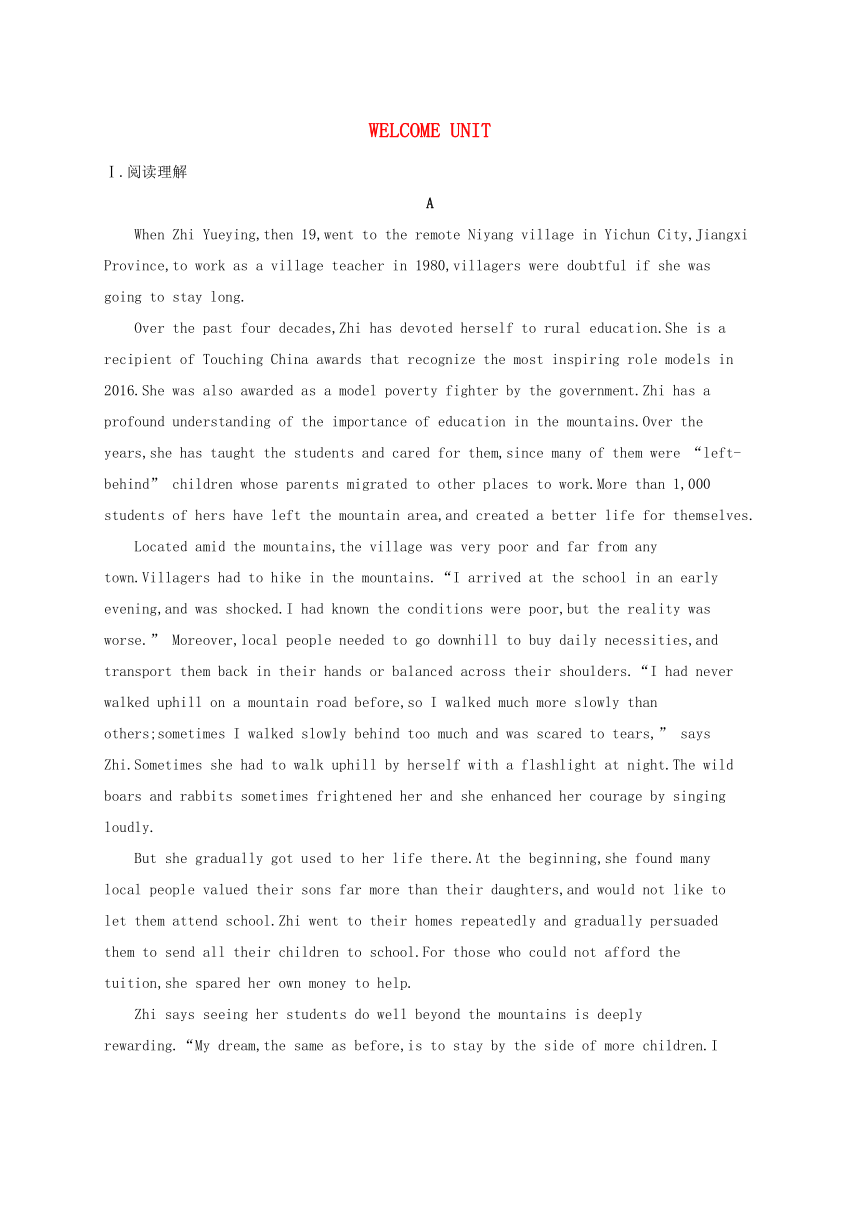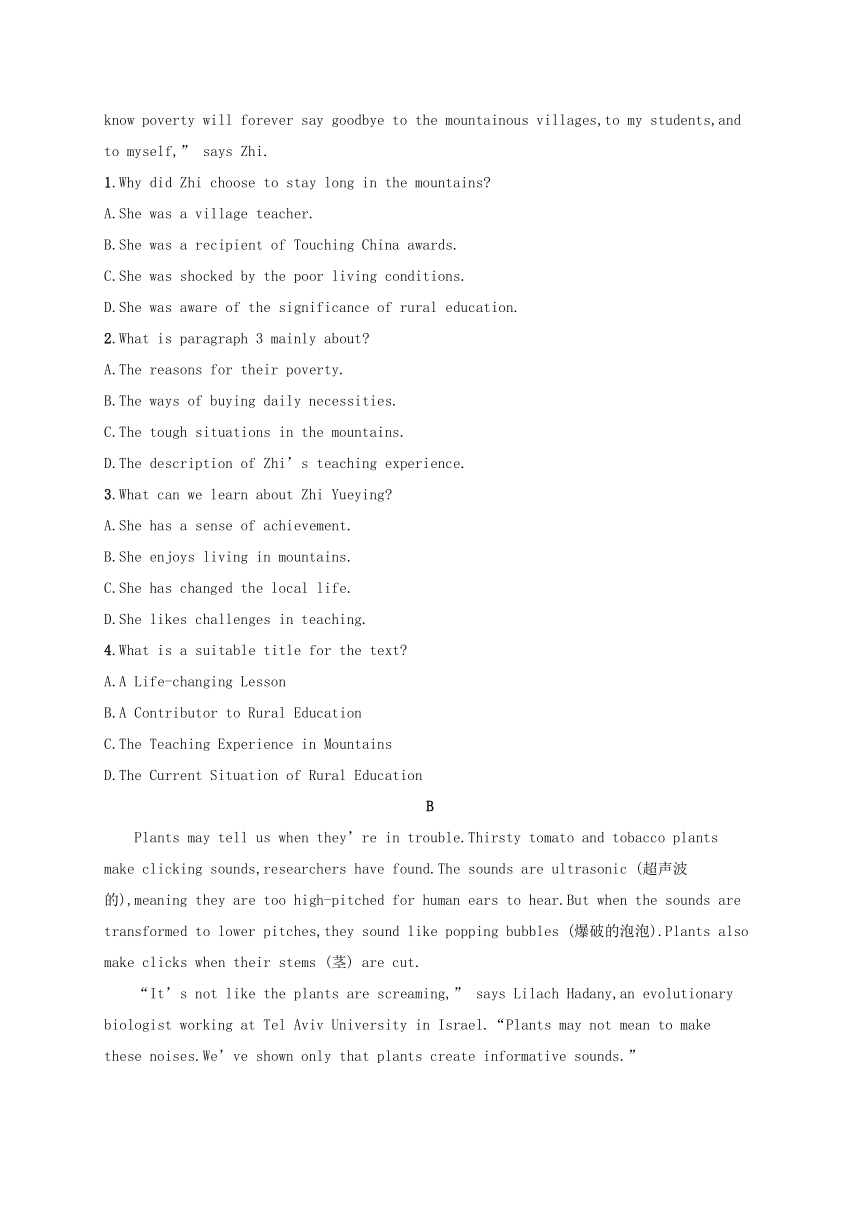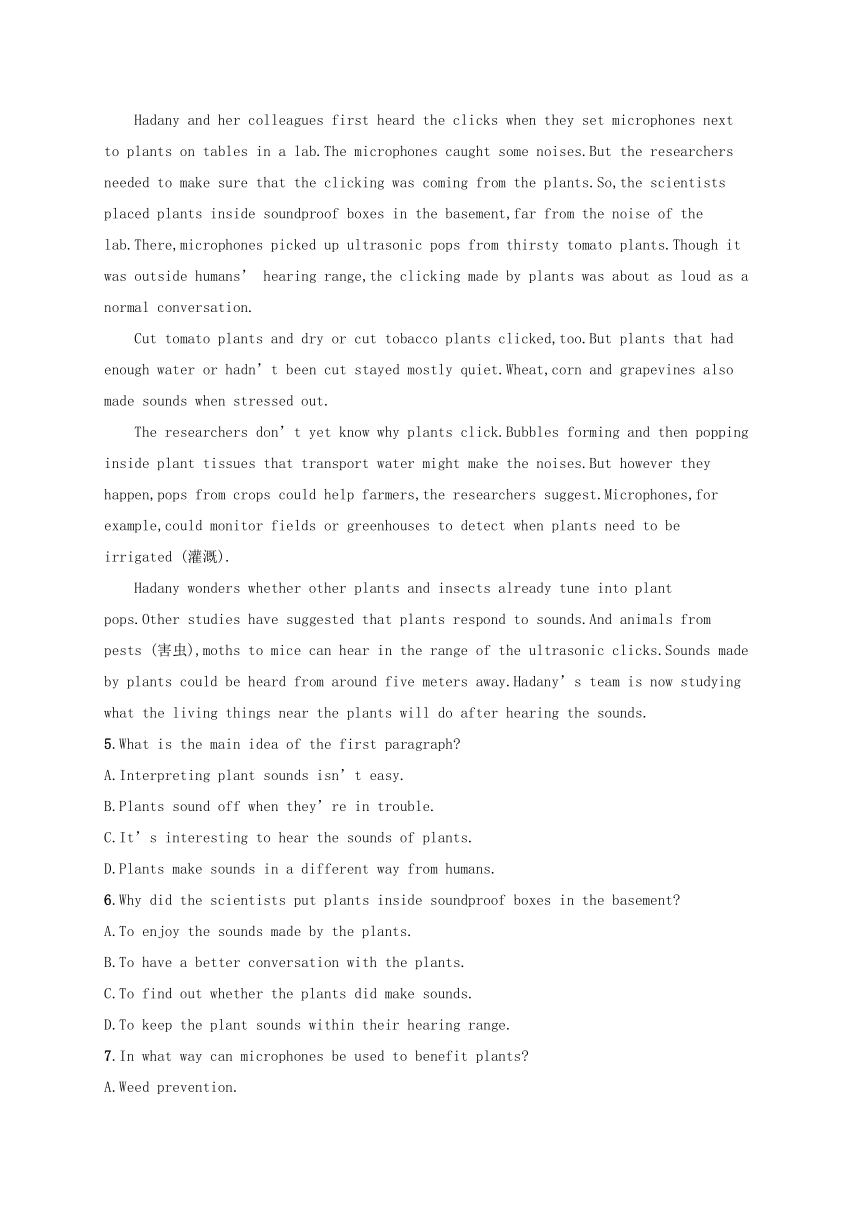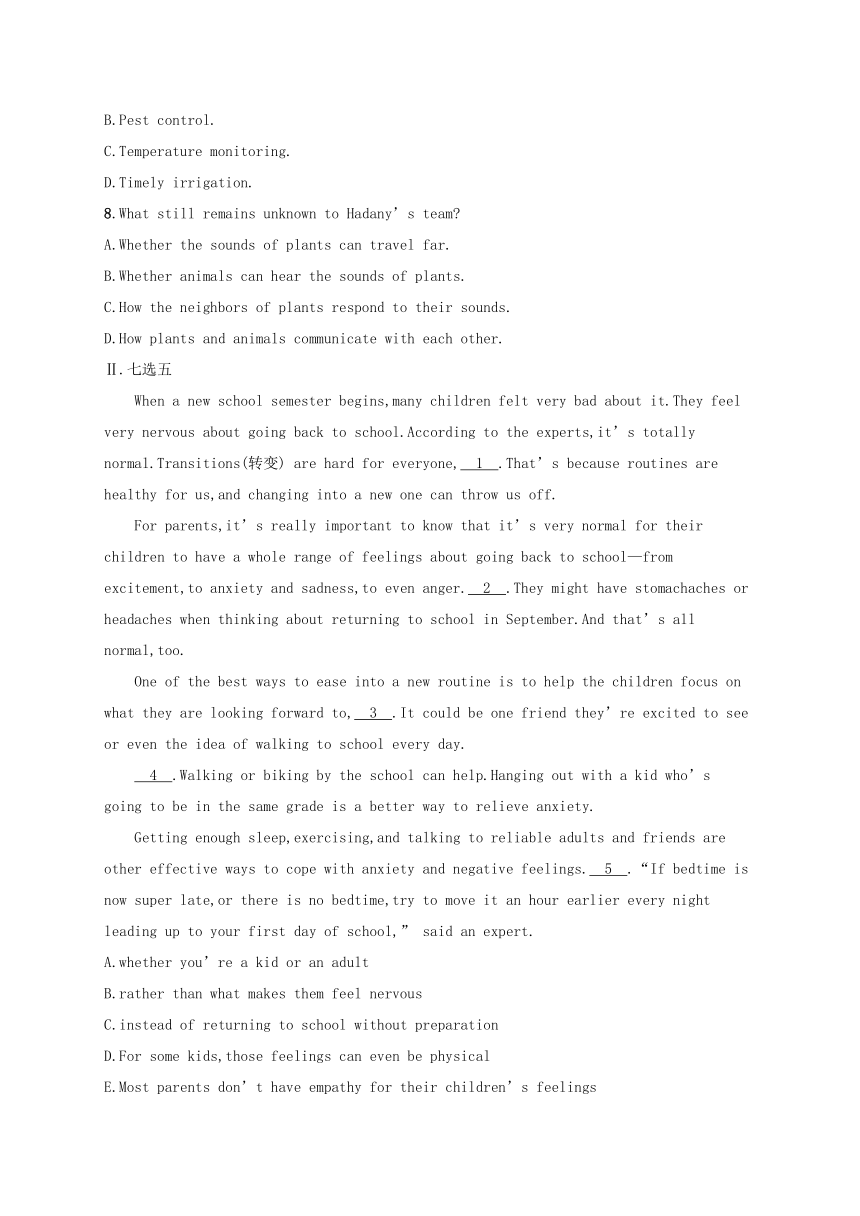人教版(2019)必修 第一册Welcome unit 同步练习(含答案)
文档属性
| 名称 | 人教版(2019)必修 第一册Welcome unit 同步练习(含答案) |

|
|
| 格式 | doc | ||
| 文件大小 | 40.6KB | ||
| 资源类型 | 教案 | ||
| 版本资源 | 人教版(2019) | ||
| 科目 | 英语 | ||
| 更新时间 | 2024-04-20 22:47:08 | ||
图片预览




文档简介
WELCOME UNIT
Ⅰ.阅读理解
A
When Zhi Yueying,then 19,went to the remote Niyang village in Yichun City,Jiangxi Province,to work as a village teacher in 1980,villagers were doubtful if she was going to stay long.
Over the past four decades,Zhi has devoted herself to rural education.She is a recipient of Touching China awards that recognize the most inspiring role models in 2016.She was also awarded as a model poverty fighter by the government.Zhi has a profound understanding of the importance of education in the mountains.Over the years,she has taught the students and cared for them,since many of them were “left-behind” children whose parents migrated to other places to work.More than 1,000 students of hers have left the mountain area,and created a better life for themselves.
Located amid the mountains,the village was very poor and far from any town.Villagers had to hike in the mountains.“I arrived at the school in an early evening,and was shocked.I had known the conditions were poor,but the reality was worse.” Moreover,local people needed to go downhill to buy daily necessities,and transport them back in their hands or balanced across their shoulders.“I had never walked uphill on a mountain road before,so I walked much more slowly than others;sometimes I walked slowly behind too much and was scared to tears,” says Zhi.Sometimes she had to walk uphill by herself with a flashlight at night.The wild boars and rabbits sometimes frightened her and she enhanced her courage by singing loudly.
But she gradually got used to her life there.At the beginning,she found many local people valued their sons far more than their daughters,and would not like to let them attend school.Zhi went to their homes repeatedly and gradually persuaded them to send all their children to school.For those who could not afford the tuition,she spared her own money to help.
Zhi says seeing her students do well beyond the mountains is deeply rewarding.“My dream,the same as before,is to stay by the side of more children.I know poverty will forever say goodbye to the mountainous villages,to my students,and to myself,” says Zhi.
1.Why did Zhi choose to stay long in the mountains
A.She was a village teacher.
B.She was a recipient of Touching China awards.
C.She was shocked by the poor living conditions.
D.She was aware of the significance of rural education.
2.What is paragraph 3 mainly about
A.The reasons for their poverty.
B.The ways of buying daily necessities.
C.The tough situations in the mountains.
D.The description of Zhi’s teaching experience.
3.What can we learn about Zhi Yueying
A.She has a sense of achievement.
B.She enjoys living in mountains.
C.She has changed the local life.
D.She likes challenges in teaching.
4.What is a suitable title for the text
A.A Life-changing Lesson
B.A Contributor to Rural Education
C.The Teaching Experience in Mountains
D.The Current Situation of Rural Education
B
Plants may tell us when they’re in trouble.Thirsty tomato and tobacco plants make clicking sounds,researchers have found.The sounds are ultrasonic (超声波的),meaning they are too high-pitched for human ears to hear.But when the sounds are transformed to lower pitches,they sound like popping bubbles (爆破的泡泡).Plants also make clicks when their stems (茎) are cut.
“It’s not like the plants are screaming,” says Lilach Hadany,an evolutionary biologist working at Tel Aviv University in Israel.“Plants may not mean to make these noises.We’ve shown only that plants create informative sounds.”
Hadany and her colleagues first heard the clicks when they set microphones next to plants on tables in a lab.The microphones caught some noises.But the researchers needed to make sure that the clicking was coming from the plants.So,the scientists placed plants inside soundproof boxes in the basement,far from the noise of the lab.There,microphones picked up ultrasonic pops from thirsty tomato plants.Though it was outside humans’ hearing range,the clicking made by plants was about as loud as a normal conversation.
Cut tomato plants and dry or cut tobacco plants clicked,too.But plants that had enough water or hadn’t been cut stayed mostly quiet.Wheat,corn and grapevines also made sounds when stressed out.
The researchers don’t yet know why plants click.Bubbles forming and then popping inside plant tissues that transport water might make the noises.But however they happen,pops from crops could help farmers,the researchers suggest.Microphones,for example,could monitor fields or greenhouses to detect when plants need to be irrigated (灌溉).
Hadany wonders whether other plants and insects already tune into plant pops.Other studies have suggested that plants respond to sounds.And animals from pests (害虫),moths to mice can hear in the range of the ultrasonic clicks.Sounds made by plants could be heard from around five meters away.Hadany’s team is now studying what the living things near the plants will do after hearing the sounds.
5.What is the main idea of the first paragraph
A.Interpreting plant sounds isn’t easy.
B.Plants sound off when they’re in trouble.
C.It’s interesting to hear the sounds of plants.
D.Plants make sounds in a different way from humans.
6.Why did the scientists put plants inside soundproof boxes in the basement
A.To enjoy the sounds made by the plants.
B.To have a better conversation with the plants.
C.To find out whether the plants did make sounds.
D.To keep the plant sounds within their hearing range.
7.In what way can microphones be used to benefit plants
A.Weed prevention.
B.Pest control.
C.Temperature monitoring.
D.Timely irrigation.
8.What still remains unknown to Hadany’s team
A.Whether the sounds of plants can travel far.
B.Whether animals can hear the sounds of plants.
C.How the neighbors of plants respond to their sounds.
D.How plants and animals communicate with each other.
Ⅱ.七选五
When a new school semester begins,many children felt very bad about it.They feel very nervous about going back to school.According to the experts,it’s totally normal.Transitions(转变) are hard for everyone, 1 .That’s because routines are healthy for us,and changing into a new one can throw us off.
For parents,it’s really important to know that it’s very normal for their children to have a whole range of feelings about going back to school—from excitement,to anxiety and sadness,to even anger. 2 .They might have stomachaches or headaches when thinking about returning to school in September.And that’s all normal,too.
One of the best ways to ease into a new routine is to help the children focus on what they are looking forward to, 3 .It could be one friend they’re excited to see or even the idea of walking to school every day.
4 .Walking or biking by the school can help.Hanging out with a kid who’s going to be in the same grade is a better way to relieve anxiety.
Getting enough sleep,exercising,and talking to reliable adults and friends are other effective ways to cope with anxiety and negative feelings. 5 .“If bedtime is now super late,or there is no bedtime,try to move it an hour earlier every night leading up to your first day of school,” said an expert.
A.whether you’re a kid or an adult
B.rather than what makes them feel nervous
C.instead of returning to school without preparation
D.For some kids,those feelings can even be physical
E.Most parents don’t have empathy for their children’s feelings
F.Besides,getting used to the new environment before school starts is also a good idea
G.It’s also suggested that kids should get their bedtime back on track a week ahead of school
Ⅲ.语法填空
China is known as the home of tea.It is said that Shennong discovered tea around 2700 BCE.At first,tea leaves 1. (chew).During the Tang Dynasty,2. (advance) were made in the processing of tea.The leaves were steamed,oxidized(氧化) and pounded into the cake form.This made tea easier 3. (transport) and more pleasing to the tongue.
The earliest batch(批次) of tea is often ready to be picked before Qingming.This precious small output of tea,widely 4. (seek) after for its outstanding quality,is called Mingqian tea.The seasonal tea is known 5. its tender leaves and fresh flavor.They have 6. better favor than theater batches which can be grown overnight.
East China’s Zhejiang Province is acknowledged as a major producer of tea.In spring,local hillsides 7.(fill) with tea workers sowing seeds on their land.In the peak seasons,many tourists flood to witness the beautiful scenery of tea farms for 8. (they),while enjoying a cup of tea.
There are many ways you can experience tea culture in China.You can visit a tea plantation in Hangzhou or elsewhere to learn 9. tea is grown and harvested.You can sit inside a 10. (tradition) teahouse and take in the classical atmosphere as you drink tea.
Ⅳ.应用文写作
(2024九省适应性测试)
你校英文报计划举办主题为“携手行动,节约粮食”的作文比赛。请你写一则活动通知,内容包括:
1.介绍活动目的;
2.说明参赛要求。
注意:
1.写作词数应为80个左右;
2.请按如下格式在相应位置作答。
WelcometoJointheEnglishWritingCompetition
_________________________________________________________________________________________________________________________________________________________________________________________________________________________________
答案:
Ⅰ.【语篇解读】本文是一篇新闻报道。文章讲述了在江西山区做乡村教师的支月英的故事。在过去的四十年中她一直致力于乡村教育,悉心教育照顾学生,她梦想着山村、她的学生和她自己都能早日脱离贫困。
1.D 细节理解题。根据第二段中“Overthepastfourdecades,Zhihasdevotedherselftoruraleducation.”和“Zhihasaprofoundunderstandingoftheimportanceofeducationinthemountains.”可知,支月英选择长期待在山里是因为她意识到了乡村教育的重要性。故选D项。
2.C 段落大意题。根据第三段中“Locatedamidthemountains,thevillagewasverypoorandfarfromanytown.Villagershadtohikeinthe...tobuydailynecessities,andtransportthembackintheirhandsorbalancedacrosstheirshoulders.”可知,山里的村庄地理位置偏僻,条件很差,人们生活非常不便。因此,第三段主要是描绘山里艰苦的环境。故选C项。
3.A 细节理解题。根据最后一段中“Zhisaysseeingherstudentsdowellbeyondthemountainsisdeeplyrewarding.”可知,支月英对于自己成果的教育感到很满意,很有成就感。
4.B 主旨大意题。通读全文可知,文章讲述了在江西山区做乡村教师的支月英的故事,在过去的四十年中她一直致力于乡村教育,做出了巨大的贡献。由此可知,B项“乡村教育的贡献者”符合文章大意,适合作为标题。
【语篇解读】本文是一篇说明文。文章主要介绍了研究人员发现植物遇到麻烦时会发出声音,麦克风可以捕捉这些声音,检测植物何时需要灌溉使植物受益。
5.B 主旨大意题。文章第一段的“Plantsmaytelluswhenthey’reintrouble.Thirstytomatoandtobaccoplantsmakeclickingsounds,researchershavefound.”可知,第一段的主旨是植物遇到麻烦时会发出声音。
6.C 细节理解题。文章第三段的“Buttheresearchersneededtomakesurethattheclickingwascomingfromtheplants.So,thescientistsplacedplantsinsidesoundproofboxesinthebasement,farfromthenoiseofthelab.”可知,科学家们把植物放在地下室的隔音箱里是为了弄清这些植物是否会发出声音。
7.D 细节理解题。文章倒数第二段的“Microphones,forexample,couldmonitorfieldsorgreenhousestodetectwhenplantsneedtobeirrigated.”可知,麦克风可以通过检测植物何时需要灌溉使植物受益。
8.C 推理判断题。文章最后一句“Hadany’steamisnowstudyingwhatthelivingthingsneartheplantswilldoafterhearingthesounds.”可知,哈达尼的团队还不知道的是植物的邻居对它们的声音有什么反应。
Ⅱ.【语篇解读】本文是一篇说明文。新学期开始的时候,学生可能会因重返学校而感到很紧张,这是很正常的。本文就如何帮助学生重新适应学校生活提出了一些建议。
1.A 上文“Whenanewschoolsemesterbegins,manychildrenfeltverybadaboutit.Theyfeelverynervousaboutgoingbacktoschool.Accordingtotheexperts,it’stotallynormal.Transitionsarehardforeveryone”提到新学期开始,学生因重返学校而感到很紧张,这是很正常的。转变对每个人来说都很难,A 项“无论你是孩子还是成年人”承接上文,符合语境。空前的 everyone 是提示词。故选A项。
2.D 上文提到,对父母来说很重要的一点是,知道孩子对重返学校有各种各样的感受是很正常的。再结合空后一句可知,他们可能会胃痛或头痛,这也很正常。可推断D项符合语境。
3.B 上文“Oneofthebestwaystoeaseintoanewroutineistohelpthechildrenfocusonwhattheyarelookingforwardto”提到,让孩子适应新常规的最好方法之一就是帮助孩子专注于他们所期待的事情,因此推断B项“而不是让他们感到紧张的事情上”承接上文,与上文形成对比,符合语境。故选B项。
4.F 根据下文“Walkingorbikingbytheschoolcanhelp.Hangingoutwithakidwho’sgoingtobeinthesamegradeisabetterwaytorelieveanxiety.”提到了两种缓解压力的办法,这些是提前让孩子适应学校的方法。再结合选项可知,F 项“此外,在开学前适应新环境也是一个好主意”可引出下文的解释。故选F项。
5.G 空后一句“Ifbedtimeisnowsuperlate,orthereisnobedtime,trytomoveitanhourearliereverynightleadinguptoyourfirstdayofschool”提到睡眠问题以及解决办法,再结合空前一句中的 “Gettingenoughsleep”可知,本段建议调整就寝时间,G 项“也建议孩子们应该在上学前一周将就寝时间调整到正常状态”承上启下,符合语境。故选G项。
Ⅲ.【语篇解读】本文是一篇说明文。文章主要介绍了中国茶叶的起源及其发展。
1.werechewed 考查动词的时态和语态。句意:起初,茶叶被咀嚼。此处在句中作谓语,句子描述过去发生的事,应用一般过去时,主语tealeaves和动词chew是被动关系,应用一般过去时的被动语态,主语是复数,故填werechewed。
2.advances 考查名词的数。句意:唐朝时期,茶叶加工技术有了长足的进步。由were可知,此处应用名词复数作主语,故填advances。
3.totransport 考查非谓语动词。句意:这使茶叶更容易运输且尝起来很好。“makesth+形容词+todo”固定用法,故填totransport。
4.sought 考查非谓语动词。句意:这种珍贵的小产量茶叶,因其优良的品质而广受追捧,被称为明前茶。句中有谓语,前后无连词,此处应用非谓语动词作后置定语,修饰名词tea,且动词seek和tea是被动关系,应用过去分词作后置定语,故填sought。
5.for 考查介词。句意:这种时令茶以其嫩叶和新鲜风味而闻名。beknownfor固定搭配,意为“因……而著名”,故填for。
6.a 考查冠词。此处表示“一种更好的口味”,为泛指,应用不定冠词来修饰,且better发音是以辅音音素开头,应用a,故填a。
7.arefilled 考查动词的时态和语态。句意:春天,当地的山坡上到处都是茶农,他们在自己的土地上播种。befilledwith“填满”,句子描述一般性事实,应用一般现在时,且主语是复数,故填arefilled。
8.themselves 考查代词。句意:在旺季,许多游客一边亲眼看着茶园的美景,一边品茶。此处表示“他们自己”,应用反身代词,故填themselves。
9.how 考查宾语从句。句意:你可以参观杭州或其他地方的茶园,了解如何种植和收获茶叶。设空处引导宾语从句,且从句缺少方式状语,应用how来修饰,故填how。
10.traditional 考查词性转换。句意:你可以坐在传统的茶馆里,一边喝茶一边感受古典的氛围。此处修饰名词teahouse,应用形容词作定语,故填traditional。
Ⅳ.
WelcometoJointheEnglishWritingCompetition
OurschoolEnglishnewspaperisexcitedtoannouncetheupcomingwritingcompetition,themed“HandinHand,SavetheFood”.Thecompetitionaimstoraiseawarenessabouttheimportanceofsavingfood.
Allstudentsareencouragedtoparticipate.Entriesshouldconsistofanoriginalpieceofwriting,focusingonthethemeoffoodwasteandshowinghowwecancontributetoitsreduction.PleasesubmityourentriestotheEnglishDepartmentmailboxbythedeadlineofJune1st.
Welookforwardtoyourparticipationandcreativesubmissions.
Ⅰ.阅读理解
A
When Zhi Yueying,then 19,went to the remote Niyang village in Yichun City,Jiangxi Province,to work as a village teacher in 1980,villagers were doubtful if she was going to stay long.
Over the past four decades,Zhi has devoted herself to rural education.She is a recipient of Touching China awards that recognize the most inspiring role models in 2016.She was also awarded as a model poverty fighter by the government.Zhi has a profound understanding of the importance of education in the mountains.Over the years,she has taught the students and cared for them,since many of them were “left-behind” children whose parents migrated to other places to work.More than 1,000 students of hers have left the mountain area,and created a better life for themselves.
Located amid the mountains,the village was very poor and far from any town.Villagers had to hike in the mountains.“I arrived at the school in an early evening,and was shocked.I had known the conditions were poor,but the reality was worse.” Moreover,local people needed to go downhill to buy daily necessities,and transport them back in their hands or balanced across their shoulders.“I had never walked uphill on a mountain road before,so I walked much more slowly than others;sometimes I walked slowly behind too much and was scared to tears,” says Zhi.Sometimes she had to walk uphill by herself with a flashlight at night.The wild boars and rabbits sometimes frightened her and she enhanced her courage by singing loudly.
But she gradually got used to her life there.At the beginning,she found many local people valued their sons far more than their daughters,and would not like to let them attend school.Zhi went to their homes repeatedly and gradually persuaded them to send all their children to school.For those who could not afford the tuition,she spared her own money to help.
Zhi says seeing her students do well beyond the mountains is deeply rewarding.“My dream,the same as before,is to stay by the side of more children.I know poverty will forever say goodbye to the mountainous villages,to my students,and to myself,” says Zhi.
1.Why did Zhi choose to stay long in the mountains
A.She was a village teacher.
B.She was a recipient of Touching China awards.
C.She was shocked by the poor living conditions.
D.She was aware of the significance of rural education.
2.What is paragraph 3 mainly about
A.The reasons for their poverty.
B.The ways of buying daily necessities.
C.The tough situations in the mountains.
D.The description of Zhi’s teaching experience.
3.What can we learn about Zhi Yueying
A.She has a sense of achievement.
B.She enjoys living in mountains.
C.She has changed the local life.
D.She likes challenges in teaching.
4.What is a suitable title for the text
A.A Life-changing Lesson
B.A Contributor to Rural Education
C.The Teaching Experience in Mountains
D.The Current Situation of Rural Education
B
Plants may tell us when they’re in trouble.Thirsty tomato and tobacco plants make clicking sounds,researchers have found.The sounds are ultrasonic (超声波的),meaning they are too high-pitched for human ears to hear.But when the sounds are transformed to lower pitches,they sound like popping bubbles (爆破的泡泡).Plants also make clicks when their stems (茎) are cut.
“It’s not like the plants are screaming,” says Lilach Hadany,an evolutionary biologist working at Tel Aviv University in Israel.“Plants may not mean to make these noises.We’ve shown only that plants create informative sounds.”
Hadany and her colleagues first heard the clicks when they set microphones next to plants on tables in a lab.The microphones caught some noises.But the researchers needed to make sure that the clicking was coming from the plants.So,the scientists placed plants inside soundproof boxes in the basement,far from the noise of the lab.There,microphones picked up ultrasonic pops from thirsty tomato plants.Though it was outside humans’ hearing range,the clicking made by plants was about as loud as a normal conversation.
Cut tomato plants and dry or cut tobacco plants clicked,too.But plants that had enough water or hadn’t been cut stayed mostly quiet.Wheat,corn and grapevines also made sounds when stressed out.
The researchers don’t yet know why plants click.Bubbles forming and then popping inside plant tissues that transport water might make the noises.But however they happen,pops from crops could help farmers,the researchers suggest.Microphones,for example,could monitor fields or greenhouses to detect when plants need to be irrigated (灌溉).
Hadany wonders whether other plants and insects already tune into plant pops.Other studies have suggested that plants respond to sounds.And animals from pests (害虫),moths to mice can hear in the range of the ultrasonic clicks.Sounds made by plants could be heard from around five meters away.Hadany’s team is now studying what the living things near the plants will do after hearing the sounds.
5.What is the main idea of the first paragraph
A.Interpreting plant sounds isn’t easy.
B.Plants sound off when they’re in trouble.
C.It’s interesting to hear the sounds of plants.
D.Plants make sounds in a different way from humans.
6.Why did the scientists put plants inside soundproof boxes in the basement
A.To enjoy the sounds made by the plants.
B.To have a better conversation with the plants.
C.To find out whether the plants did make sounds.
D.To keep the plant sounds within their hearing range.
7.In what way can microphones be used to benefit plants
A.Weed prevention.
B.Pest control.
C.Temperature monitoring.
D.Timely irrigation.
8.What still remains unknown to Hadany’s team
A.Whether the sounds of plants can travel far.
B.Whether animals can hear the sounds of plants.
C.How the neighbors of plants respond to their sounds.
D.How plants and animals communicate with each other.
Ⅱ.七选五
When a new school semester begins,many children felt very bad about it.They feel very nervous about going back to school.According to the experts,it’s totally normal.Transitions(转变) are hard for everyone, 1 .That’s because routines are healthy for us,and changing into a new one can throw us off.
For parents,it’s really important to know that it’s very normal for their children to have a whole range of feelings about going back to school—from excitement,to anxiety and sadness,to even anger. 2 .They might have stomachaches or headaches when thinking about returning to school in September.And that’s all normal,too.
One of the best ways to ease into a new routine is to help the children focus on what they are looking forward to, 3 .It could be one friend they’re excited to see or even the idea of walking to school every day.
4 .Walking or biking by the school can help.Hanging out with a kid who’s going to be in the same grade is a better way to relieve anxiety.
Getting enough sleep,exercising,and talking to reliable adults and friends are other effective ways to cope with anxiety and negative feelings. 5 .“If bedtime is now super late,or there is no bedtime,try to move it an hour earlier every night leading up to your first day of school,” said an expert.
A.whether you’re a kid or an adult
B.rather than what makes them feel nervous
C.instead of returning to school without preparation
D.For some kids,those feelings can even be physical
E.Most parents don’t have empathy for their children’s feelings
F.Besides,getting used to the new environment before school starts is also a good idea
G.It’s also suggested that kids should get their bedtime back on track a week ahead of school
Ⅲ.语法填空
China is known as the home of tea.It is said that Shennong discovered tea around 2700 BCE.At first,tea leaves 1. (chew).During the Tang Dynasty,2. (advance) were made in the processing of tea.The leaves were steamed,oxidized(氧化) and pounded into the cake form.This made tea easier 3. (transport) and more pleasing to the tongue.
The earliest batch(批次) of tea is often ready to be picked before Qingming.This precious small output of tea,widely 4. (seek) after for its outstanding quality,is called Mingqian tea.The seasonal tea is known 5. its tender leaves and fresh flavor.They have 6. better favor than theater batches which can be grown overnight.
East China’s Zhejiang Province is acknowledged as a major producer of tea.In spring,local hillsides 7.(fill) with tea workers sowing seeds on their land.In the peak seasons,many tourists flood to witness the beautiful scenery of tea farms for 8. (they),while enjoying a cup of tea.
There are many ways you can experience tea culture in China.You can visit a tea plantation in Hangzhou or elsewhere to learn 9. tea is grown and harvested.You can sit inside a 10. (tradition) teahouse and take in the classical atmosphere as you drink tea.
Ⅳ.应用文写作
(2024九省适应性测试)
你校英文报计划举办主题为“携手行动,节约粮食”的作文比赛。请你写一则活动通知,内容包括:
1.介绍活动目的;
2.说明参赛要求。
注意:
1.写作词数应为80个左右;
2.请按如下格式在相应位置作答。
WelcometoJointheEnglishWritingCompetition
_________________________________________________________________________________________________________________________________________________________________________________________________________________________________
答案:
Ⅰ.【语篇解读】本文是一篇新闻报道。文章讲述了在江西山区做乡村教师的支月英的故事。在过去的四十年中她一直致力于乡村教育,悉心教育照顾学生,她梦想着山村、她的学生和她自己都能早日脱离贫困。
1.D 细节理解题。根据第二段中“Overthepastfourdecades,Zhihasdevotedherselftoruraleducation.”和“Zhihasaprofoundunderstandingoftheimportanceofeducationinthemountains.”可知,支月英选择长期待在山里是因为她意识到了乡村教育的重要性。故选D项。
2.C 段落大意题。根据第三段中“Locatedamidthemountains,thevillagewasverypoorandfarfromanytown.Villagershadtohikeinthe...tobuydailynecessities,andtransportthembackintheirhandsorbalancedacrosstheirshoulders.”可知,山里的村庄地理位置偏僻,条件很差,人们生活非常不便。因此,第三段主要是描绘山里艰苦的环境。故选C项。
3.A 细节理解题。根据最后一段中“Zhisaysseeingherstudentsdowellbeyondthemountainsisdeeplyrewarding.”可知,支月英对于自己成果的教育感到很满意,很有成就感。
4.B 主旨大意题。通读全文可知,文章讲述了在江西山区做乡村教师的支月英的故事,在过去的四十年中她一直致力于乡村教育,做出了巨大的贡献。由此可知,B项“乡村教育的贡献者”符合文章大意,适合作为标题。
【语篇解读】本文是一篇说明文。文章主要介绍了研究人员发现植物遇到麻烦时会发出声音,麦克风可以捕捉这些声音,检测植物何时需要灌溉使植物受益。
5.B 主旨大意题。文章第一段的“Plantsmaytelluswhenthey’reintrouble.Thirstytomatoandtobaccoplantsmakeclickingsounds,researchershavefound.”可知,第一段的主旨是植物遇到麻烦时会发出声音。
6.C 细节理解题。文章第三段的“Buttheresearchersneededtomakesurethattheclickingwascomingfromtheplants.So,thescientistsplacedplantsinsidesoundproofboxesinthebasement,farfromthenoiseofthelab.”可知,科学家们把植物放在地下室的隔音箱里是为了弄清这些植物是否会发出声音。
7.D 细节理解题。文章倒数第二段的“Microphones,forexample,couldmonitorfieldsorgreenhousestodetectwhenplantsneedtobeirrigated.”可知,麦克风可以通过检测植物何时需要灌溉使植物受益。
8.C 推理判断题。文章最后一句“Hadany’steamisnowstudyingwhatthelivingthingsneartheplantswilldoafterhearingthesounds.”可知,哈达尼的团队还不知道的是植物的邻居对它们的声音有什么反应。
Ⅱ.【语篇解读】本文是一篇说明文。新学期开始的时候,学生可能会因重返学校而感到很紧张,这是很正常的。本文就如何帮助学生重新适应学校生活提出了一些建议。
1.A 上文“Whenanewschoolsemesterbegins,manychildrenfeltverybadaboutit.Theyfeelverynervousaboutgoingbacktoschool.Accordingtotheexperts,it’stotallynormal.Transitionsarehardforeveryone”提到新学期开始,学生因重返学校而感到很紧张,这是很正常的。转变对每个人来说都很难,A 项“无论你是孩子还是成年人”承接上文,符合语境。空前的 everyone 是提示词。故选A项。
2.D 上文提到,对父母来说很重要的一点是,知道孩子对重返学校有各种各样的感受是很正常的。再结合空后一句可知,他们可能会胃痛或头痛,这也很正常。可推断D项符合语境。
3.B 上文“Oneofthebestwaystoeaseintoanewroutineistohelpthechildrenfocusonwhattheyarelookingforwardto”提到,让孩子适应新常规的最好方法之一就是帮助孩子专注于他们所期待的事情,因此推断B项“而不是让他们感到紧张的事情上”承接上文,与上文形成对比,符合语境。故选B项。
4.F 根据下文“Walkingorbikingbytheschoolcanhelp.Hangingoutwithakidwho’sgoingtobeinthesamegradeisabetterwaytorelieveanxiety.”提到了两种缓解压力的办法,这些是提前让孩子适应学校的方法。再结合选项可知,F 项“此外,在开学前适应新环境也是一个好主意”可引出下文的解释。故选F项。
5.G 空后一句“Ifbedtimeisnowsuperlate,orthereisnobedtime,trytomoveitanhourearliereverynightleadinguptoyourfirstdayofschool”提到睡眠问题以及解决办法,再结合空前一句中的 “Gettingenoughsleep”可知,本段建议调整就寝时间,G 项“也建议孩子们应该在上学前一周将就寝时间调整到正常状态”承上启下,符合语境。故选G项。
Ⅲ.【语篇解读】本文是一篇说明文。文章主要介绍了中国茶叶的起源及其发展。
1.werechewed 考查动词的时态和语态。句意:起初,茶叶被咀嚼。此处在句中作谓语,句子描述过去发生的事,应用一般过去时,主语tealeaves和动词chew是被动关系,应用一般过去时的被动语态,主语是复数,故填werechewed。
2.advances 考查名词的数。句意:唐朝时期,茶叶加工技术有了长足的进步。由were可知,此处应用名词复数作主语,故填advances。
3.totransport 考查非谓语动词。句意:这使茶叶更容易运输且尝起来很好。“makesth+形容词+todo”固定用法,故填totransport。
4.sought 考查非谓语动词。句意:这种珍贵的小产量茶叶,因其优良的品质而广受追捧,被称为明前茶。句中有谓语,前后无连词,此处应用非谓语动词作后置定语,修饰名词tea,且动词seek和tea是被动关系,应用过去分词作后置定语,故填sought。
5.for 考查介词。句意:这种时令茶以其嫩叶和新鲜风味而闻名。beknownfor固定搭配,意为“因……而著名”,故填for。
6.a 考查冠词。此处表示“一种更好的口味”,为泛指,应用不定冠词来修饰,且better发音是以辅音音素开头,应用a,故填a。
7.arefilled 考查动词的时态和语态。句意:春天,当地的山坡上到处都是茶农,他们在自己的土地上播种。befilledwith“填满”,句子描述一般性事实,应用一般现在时,且主语是复数,故填arefilled。
8.themselves 考查代词。句意:在旺季,许多游客一边亲眼看着茶园的美景,一边品茶。此处表示“他们自己”,应用反身代词,故填themselves。
9.how 考查宾语从句。句意:你可以参观杭州或其他地方的茶园,了解如何种植和收获茶叶。设空处引导宾语从句,且从句缺少方式状语,应用how来修饰,故填how。
10.traditional 考查词性转换。句意:你可以坐在传统的茶馆里,一边喝茶一边感受古典的氛围。此处修饰名词teahouse,应用形容词作定语,故填traditional。
Ⅳ.
WelcometoJointheEnglishWritingCompetition
OurschoolEnglishnewspaperisexcitedtoannouncetheupcomingwritingcompetition,themed“HandinHand,SavetheFood”.Thecompetitionaimstoraiseawarenessabouttheimportanceofsavingfood.
Allstudentsareencouragedtoparticipate.Entriesshouldconsistofanoriginalpieceofwriting,focusingonthethemeoffoodwasteandshowinghowwecancontributetoitsreduction.PleasesubmityourentriestotheEnglishDepartmentmailboxbythedeadlineofJune1st.
Welookforwardtoyourparticipationandcreativesubmissions.
